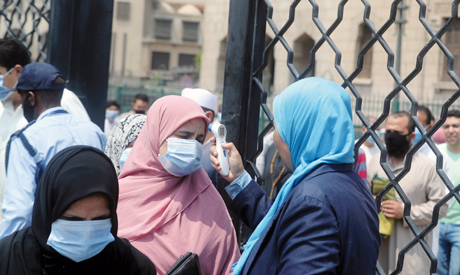
Egyptians must adhere to precautionary measures to limit coronavirus’ second wave (photo: Reuters)
A second wave of Covid-19 is expected in Egypt sometime in October. It will coincide with the winter season which overlaps with the influenza virus, thus creatinga formidable challenge to doctors who need to accurately diagnose patients.
Amid fears of a second wave of the virus, the Ministry of Health and Population announced the reactivation of its coexistence plan with the coronavirus, after the number of infections during the past days exceeded 200 cases a day.
Spokesman for the Health Ministry Khaled Megahed said the ministry witnessed an increase in the number of Covid-19 patients. After the numbers of daily infections fell below 200 a day, they recently increased. Therefore “the plan for coexistence with the coronavirus will be reactivated by applying precautionary measures in institutions and forcing everyone to wear masks on the streets and in public transportation and for the Ministry of Interior to penalise violators,” Megahed said.
“Patients with mild cases of Covid-19 will remain isolated at home and given treatment there. Severe cases are to be treated at any of the ministry’s quarantine hospitals,” he added.
Hossam Hosni, head of the Health Ministry’s coronavirus committee, pointed out that the second wave had already begun globally but had not reached Egypt. Although the symptoms of influenza and Covid-19 are similar, the virus has mutated, introducing additional symptoms.
“The virus now attacks not only our lungs, but our gastrointestinal tract as well. This explains the significant number of cases in which patients show gastrointestinal symptoms such as diarrhea, nausea and vomiting,” Hosni said.
The Ministry of Health said it was ready for all possible scenarios and that hospitals have quick-diagnostic tools needed for this stage. Hosni noted that 21 isolation hospitals have been reopened to treat moderate to severe Covid-19 cases. This took place after weeks of announcing zero Covid-19 cases in them.
“Also, Egypt has so far received voluntary plasma donors in more than 15 centres all over the country. The convalescent plasma of 420 donors has been accepted,” Hosni said, adding that plasma had achieved a success rate of more than 60 per cent in critical and severe cases.
Manal Salama, coordinator of the Health Ministry’s coronavirus committee, told Al-Ahram Weekly that the ministry now has a significant strategic stock of convalescent plasma. “Plasma treatment has revealed strong results but it does not work with all cases. However, injecting convalescent plasma has contributed to reducing the need for ventilators and increasing the number of recoveries,” Salama said.
Salama pointed out that everyone must take the necessary precautions against the virus. “Precautionary measures will be re-implemented decisively in institutions, companies, factories and transportation. All citizens must not be present in any of these sites without wearing masks, adopting social distancing measures and tightening the application of precautionary measures inside public facilities.The role of police checks will also be activated,” said Salama.
According to Salama, in addition to the reopening of 21 hospitals to receive Covid-19 patients, the ministry’s remaining hospitals will be allocated for screening. The ministry will also work on maintaining the capacity of the hospitals in order to absorb any unexpected increase in the number of Covid-19 patients. She said the ministry has already completed training its medical staff on intensive care skills, infection control and Covid-19 treatment protocols.
*A version of this article appears in print in the 3 September, 2020 edition of Al-Ahram Weekly
Short link: